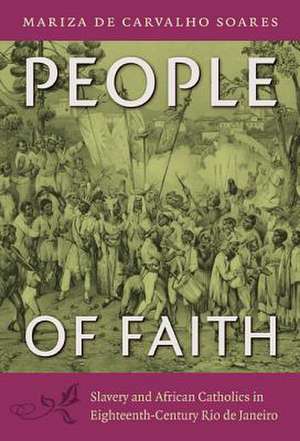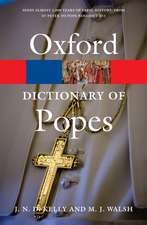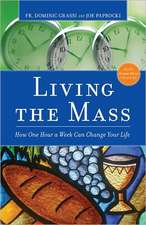People of Faith – Slavery and African Catholics in Eighteenth–Century Rio de Janeiro: Latin America in Translation
Autor Mariza De Carva Soares, Jerry Dennis Metzen Limba Engleză Paperback – 9 oct 2011
Din seria Latin America in Translation
-
 Preț: 136.56 lei
Preț: 136.56 lei -
 Preț: 161.86 lei
Preț: 161.86 lei -
 Preț: 183.69 lei
Preț: 183.69 lei -
 Preț: 220.52 lei
Preț: 220.52 lei -
 Preț: 239.93 lei
Preț: 239.93 lei -
 Preț: 160.40 lei
Preț: 160.40 lei -
 Preț: 222.58 lei
Preț: 222.58 lei -
 Preț: 226.59 lei
Preț: 226.59 lei -
 Preț: 302.96 lei
Preț: 302.96 lei -
 Preț: 262.32 lei
Preț: 262.32 lei -
 Preț: 253.40 lei
Preț: 253.40 lei -
 Preț: 263.68 lei
Preț: 263.68 lei -
 Preț: 219.58 lei
Preț: 219.58 lei -
 Preț: 213.24 lei
Preț: 213.24 lei -
 Preț: 308.13 lei
Preț: 308.13 lei -
 Preț: 234.12 lei
Preț: 234.12 lei -
 Preț: 198.32 lei
Preț: 198.32 lei -
 Preț: 179.42 lei
Preț: 179.42 lei -
 Preț: 192.48 lei
Preț: 192.48 lei -
 Preț: 313.07 lei
Preț: 313.07 lei -
 Preț: 220.08 lei
Preț: 220.08 lei -
 Preț: 245.61 lei
Preț: 245.61 lei -
 Preț: 291.83 lei
Preț: 291.83 lei
Preț: 218.35 lei
Nou
Puncte Express: 328
Preț estimativ în valută:
41.79€ • 43.46$ • 34.50£
41.79€ • 43.46$ • 34.50£
Carte tipărită la comandă
Livrare economică 14-28 aprilie
Preluare comenzi: 021 569.72.76
Specificații
ISBN-13: 9780822350408
ISBN-10: 0822350408
Pagini: 336
Ilustrații: 12 illustrations, 21 tables
Dimensiuni: 156 x 229 x 15 mm
Greutate: 0.36 kg
Ediția:New.
Editura: MD – Duke University Press
Seria Latin America in Translation
ISBN-10: 0822350408
Pagini: 336
Ilustrații: 12 illustrations, 21 tables
Dimensiuni: 156 x 229 x 15 mm
Greutate: 0.36 kg
Ediția:New.
Editura: MD – Duke University Press
Seria Latin America in Translation
Cuprins
List of Tables ix
Acknowledgments xi
Introduction 1
Part One
1. From Ethiopia to Guinea 19
2. Commerce with the Mina Coast 40
3. African "Nations" and Provenience Groups Gallery of Illustrations 67
Gallery of Illustrations 101
Part Two
4. Urban Life and Brotherhoods in the City 113
5. Constructing a Religious Norm 146
6. Conflict and Ethnic Identity among Mahi 183
Postscript 223
Appendix 241
Notes 249
Bibliography 293
Index 309
Acknowledgments xi
Introduction 1
Part One
1. From Ethiopia to Guinea 19
2. Commerce with the Mina Coast 40
3. African "Nations" and Provenience Groups Gallery of Illustrations 67
Gallery of Illustrations 101
Part Two
4. Urban Life and Brotherhoods in the City 113
5. Constructing a Religious Norm 146
6. Conflict and Ethnic Identity among Mahi 183
Postscript 223
Appendix 241
Notes 249
Bibliography 293
Index 309
Recenzii
"Among the many fine works on Atlantic slavery and the African diaspora published by Brazilian historians in recent years, People of Faith stands out as a particularly innovative and important study of great interest to an English-speaking audience. One of the qualities that distinguishes it from related studies is the way that Mariza de Carvalho Soares carefully works her way through the sparse documentary evidence, allowing the reader to follow her interpretive method and to understand how she arrives at particular conclusions. Barbara Weinstein, author of For Social Peace in Brazil: Industrialists and the Remaking of the Working Class in Sao Paulo, 1920-1964
"The questions of cultural continuities and African identities in Brazil have become central to the understanding of slavery and of Afro-Brazilian life. This book, centered on one group of the so-called Mina nation in Rio de Janeiro, presents one of the best-documented, most perceptive discussions of these issues in the context of the Catholic society of Brazil. Here we can see clearly that cultures and identities were often layered and complex and adapted to local realities. This book is required reading for anyone interested in the African diaspora and questions of cultural continuities and creations. Stuart B. Schwartz, Yale University
"For scholars interested in the slave trade on either side of the Atlantic, this book offers a highly useful consideration of the existing secondary literature and the known primary records. Soares also provides insightful original arguments and commentary on areas yet to be studied. Soaress analysis is centered around a series of baptism records of enslaved and freed Africans from eighteenth-century Rio de Janeiro. Her analysis of these records is quantitatively nuanced and thoroughly explained as to its strengths and limitations as a data set...This book is full of rich analysis and thoughtful argument. - Carolyne Ryan, H-Empire, January 2013
...Soares explores the presence of Mina and Mahi in eighteenth-century Rio de Janeiro. The book discusses how these groups organized themselves through religious activity how slavery, ethnicity and religiosity contributed to the construction of their identities. - Slavery & Abolition, Volume 34, Issue 1, 2013
"Among the many fine works on Atlantic slavery and the African diaspora published by Brazilian historians in recent years, People of Faith stands out as a particularly innovative and important study of great interest to an English-speaking audience. One of the qualities that distinguishes it from related studies is the way that Mariza de Carvalho Soares carefully works her way through the sparse documentary evidence, allowing the reader to follow her interpretive method and to understand how she arrives at particular conclusions." Barbara Weinstein, author of For Social Peace in Brazil: Industrialists and the Remaking of the Working Class in Sao Paulo, 1920-1964 "The questions of cultural continuities and African identities in Brazil have become central to the understanding of slavery and of Afro-Brazilian life. This book, centered on one group of the so-called Mina nation in Rio de Janeiro, presents one of the best-documented, most perceptive discussions of these issues in the context of the Catholic society of Brazil. Here we can see clearly that cultures and identities were often layered and complex and adapted to local realities. This book is required reading for anyone interested in the African diaspora and questions of cultural continuities and creations." Stuart B. Schwartz, Yale University "For scholars interested in the slave trade on either side of the Atlantic, this book offers a highly useful consideration of the existing secondary literature and the known primary records. Soares also provides insightful original arguments and commentary on areas yet to be studied. Soares's analysis is centered around a series of baptism records of enslaved and freed Africans from eighteenth-century Rio de Janeiro. Her analysis of these records is quantitatively nuanced and thoroughly explained as to its strengths and limitations as a data set...This book is full of rich analysis and thoughtful argument." - Carolyne Ryan, H-Empire, January 2013 "...Soares explores the presence of Mina and Mahi in eighteenth-century Rio de Janeiro. The book discusses how these groups organized themselves through religious activity how slavery, ethnicity and religiosity contributed to the construction of their identities." - Slavery & Abolition, Volume 34, Issue 1, 2013
"The questions of cultural continuities and African identities in Brazil have become central to the understanding of slavery and of Afro-Brazilian life. This book, centered on one group of the so-called Mina nation in Rio de Janeiro, presents one of the best-documented, most perceptive discussions of these issues in the context of the Catholic society of Brazil. Here we can see clearly that cultures and identities were often layered and complex and adapted to local realities. This book is required reading for anyone interested in the African diaspora and questions of cultural continuities and creations. Stuart B. Schwartz, Yale University
"For scholars interested in the slave trade on either side of the Atlantic, this book offers a highly useful consideration of the existing secondary literature and the known primary records. Soares also provides insightful original arguments and commentary on areas yet to be studied. Soaress analysis is centered around a series of baptism records of enslaved and freed Africans from eighteenth-century Rio de Janeiro. Her analysis of these records is quantitatively nuanced and thoroughly explained as to its strengths and limitations as a data set...This book is full of rich analysis and thoughtful argument. - Carolyne Ryan, H-Empire, January 2013
...Soares explores the presence of Mina and Mahi in eighteenth-century Rio de Janeiro. The book discusses how these groups organized themselves through religious activity how slavery, ethnicity and religiosity contributed to the construction of their identities. - Slavery & Abolition, Volume 34, Issue 1, 2013
"Among the many fine works on Atlantic slavery and the African diaspora published by Brazilian historians in recent years, People of Faith stands out as a particularly innovative and important study of great interest to an English-speaking audience. One of the qualities that distinguishes it from related studies is the way that Mariza de Carvalho Soares carefully works her way through the sparse documentary evidence, allowing the reader to follow her interpretive method and to understand how she arrives at particular conclusions." Barbara Weinstein, author of For Social Peace in Brazil: Industrialists and the Remaking of the Working Class in Sao Paulo, 1920-1964 "The questions of cultural continuities and African identities in Brazil have become central to the understanding of slavery and of Afro-Brazilian life. This book, centered on one group of the so-called Mina nation in Rio de Janeiro, presents one of the best-documented, most perceptive discussions of these issues in the context of the Catholic society of Brazil. Here we can see clearly that cultures and identities were often layered and complex and adapted to local realities. This book is required reading for anyone interested in the African diaspora and questions of cultural continuities and creations." Stuart B. Schwartz, Yale University "For scholars interested in the slave trade on either side of the Atlantic, this book offers a highly useful consideration of the existing secondary literature and the known primary records. Soares also provides insightful original arguments and commentary on areas yet to be studied. Soares's analysis is centered around a series of baptism records of enslaved and freed Africans from eighteenth-century Rio de Janeiro. Her analysis of these records is quantitatively nuanced and thoroughly explained as to its strengths and limitations as a data set...This book is full of rich analysis and thoughtful argument." - Carolyne Ryan, H-Empire, January 2013 "...Soares explores the presence of Mina and Mahi in eighteenth-century Rio de Janeiro. The book discusses how these groups organized themselves through religious activity how slavery, ethnicity and religiosity contributed to the construction of their identities." - Slavery & Abolition, Volume 34, Issue 1, 2013
Notă biografică
Descriere
Reconstructs the everyday lives of Mina slaves transported in the eighteenth century to Rio de Janeiro from the African West Coast, in particular from modern-day Benin











